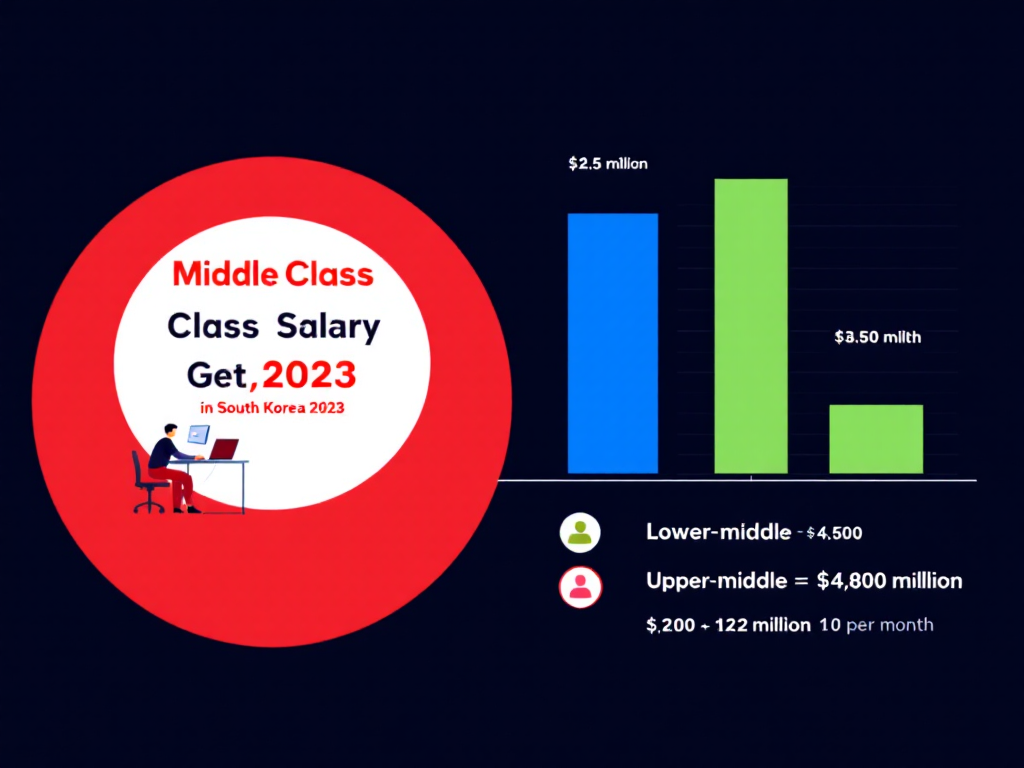Introduction: Navigating the Middle-Class Salary Landscape
Imagine a bustling South Korean family, living in the dynamic city of Seoul. The parents juggle demanding jobs while ensuring their children receive quality education. As they manage their monthly finances, they often wonder about what truly defines a middle-class salary in 2023. Understanding this question is vital not just for personal financial stability but for making informed decisions about their lifestyle and future investments.
In today’s rapidly changing economic environment, grasping the intricacies of middle-class salaries helps individuals and businesses alike in navigating financial complexities. Enter PayInOne, a platform designed to simplify these challenges by offering comprehensive solutions for managing finances efficiently, ensuring seamless cross-border transactions, and adapting to the evolving economic landscape.
Context: Economic Trends Impacting Salaries
South Korea’s economy has witnessed significant growth over the past few decades, transforming it into a major global player. However, with this growth comes the challenge of inflation, which has been steadily affecting the purchasing power of its citizens. In 2023, the country faces the dual pressures of maintaining economic momentum while addressing inflationary concerns.
Recent policy changes have also impacted salaries. The South Korean government has introduced measures aimed at bolstering economic stability, such as adjustments in minimum wage policies and tax reforms. These changes are designed to support the middle class and stimulate domestic consumption.
Moreover, the interconnectedness of global markets means that South Korean salaries are not immune to international trends. Fluctuations in global markets, driven by factors like trade tensions and currency volatility, can have a direct impact on local salary structures, influencing how businesses and employees strategize their financial planning.
Challenges Facing the Middle Class
The middle class in South Korea faces several challenges, chief among them being the rising cost of living. Housing expenses in major cities like Seoul have soared, making it increasingly difficult for families to afford comfortable living spaces. This financial pressure is compounded by the cost of education and healthcare, which continue to rise.
Currency fluctuations further complicate the financial landscape. The South Korean won’s volatility against major currencies affects purchasing power, especially for goods and services that rely on imports. This fluctuation can lead to uncertainty in household budgeting and long-term financial planning.
Balancing work-life demands with economic pressures is another significant challenge. The traditional corporate culture in South Korea often emphasizes long working hours, leaving little room for personal time. This imbalance can lead to stress and burnout, negatively impacting productivity and overall quality of life.
Opportunities for Business and Employees
Despite these challenges, there are promising opportunities for both businesses and employees in South Korea. The tech and innovation sectors are experiencing robust growth, offering lucrative salary prospects for skilled professionals. As companies increasingly embrace digital transformation, the demand for expertise in areas like AI, cybersecurity, and software development is rising.
The potential for remote work and international collaborations is another exciting development. With the global shift towards hybrid work models, South Korean professionals can explore opportunities beyond their borders, potentially increasing their earning potential and gaining diverse experiences.

Adopting flexible payment systems, such as PayInOne, can further enhance these opportunities. By streamlining complex financial transactions and offering solutions for managing multi-currency payments, platforms like PayInOne empower businesses to operate efficiently on a global scale, ultimately benefiting employees with more stable and predictable income streams.
Expert Insights: Navigating Salary Negotiations
What the Experts Say
Industry experts emphasize the importance of staying informed about market trends when negotiating salaries. According to a report by the Korea Labor Institute, understanding the nuances of the labor market can provide employees with an edge during discussions. They recommend leveraging data and analytics to make informed arguments for salary increases.
Pitfalls to Avoid
- Don’t enter negotiations without adequate research and preparation.
- Avoid undervaluing your skills and contributions to the organization.
- Steer clear of accepting the first offer without exploring potential for growth or additional benefits.
By incorporating these strategies, individuals can navigate salary negotiations more effectively, ensuring they receive compensation reflective of their skills and contributions.
Case Studies: Real-World Financial Strategies
Consider a mid-sized tech company in Seoul that faced high employee turnover due to non-competitive salaries. By leveraging salary data and benchmarking against industry standards, they restructured their compensation packages. This strategic move not only improved retention rates but also attracted top talent, fostering a dynamic and motivated workforce.
On a personal level, take the story of Ji-hoon, a software engineer who sought to enhance his financial stability. By using PayInOne to manage his freelance projects, he streamlined his invoicing process and minimized currency exchange losses. This approach enabled him to save both time and money, providing a clearer picture of his financial health.
Future Outlook: Preparing for Economic Shifts
Looking ahead, the structure of middle-class salaries in South Korea is poised for transformation. Emerging technologies like blockchain and the increasing adoption of digital currencies are expected to redefine traditional payment systems. This evolution presents new opportunities for businesses and individuals to optimize their financial strategies.
Potential regulatory changes, such as policies aimed at further increasing the minimum wage or enhancing worker protections, may also impact salary structures. Staying informed and adaptable to these changes will be crucial for maintaining competitiveness in the global market.
Conclusion: Embracing Financial Opportunities
Understanding the dynamics of middle-class salaries in South Korea is essential for navigating the complex economic landscape of 2023. By proactively adapting to market trends and leveraging innovative tools like PayInOne, both individuals and businesses can seize financial opportunities and enhance their economic resilience.
We invite you to explore PayInOne for deeper insights into financial management and discover how it can simplify your global operations. Ready to simplify your global operations and tackle salary management head-on? Discover how PayInOne can help.
